Black fathers: Still valuable, still needed
By Charlene Muhammad -National Correspondent- | Last updated: Jun 12, 2012 - 1:58:36 PMWhat's your opinion on this article?
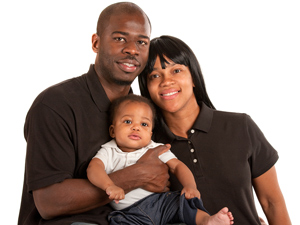
Black couple with their child. Bilal Qayyum, not shown, believes good fatherhood is linked to good marriages. He created 23-year-old Fathers’ Day Rally in Philadelphia.
|
But Black fatherhood isn’t based solely on how much money men give women or child support checks they pay through the courts, family advocates say. It’s knowing Black men still matter and are vital in the lives of their children, families and communities despite the challenges they face.
“I feel that Black fathers have a lot more responsibility than we give them credit for. There are some Black fathers who not only take care of their children, but they take care of their girlfriends’ children, their step-children, or their nieces and nephews as well,” said Katrina Akande, a doctoral candidate at the University of Kentucky.
She is studying Black fathers whose children don’t live with them but instead of referring to themselves as “non-custodial” fathers as the system does, they prefer the lingo “24/7,” she said. They feel society’s saying they don’t take care of their children, but they do, 24 hours a day, seven days a week, she elaborated.
There are Black men present and making a difference for their families, whether free and financially stable with one or two children, 60-years-old and raising infants, adolescents, grandchildren, taking care of an aging mother, or incarcerated, she said.
Ms. Akinde noted some fathers who have been incarcerated really want to connect with their children help their offspring avoid their troubled paths. Sadly others who feel they’ve nothing to give want to stay as far away from children as possible, she added.
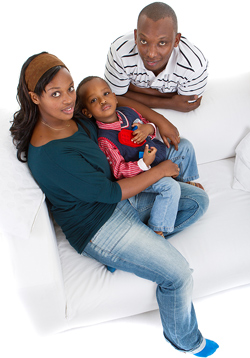
|
“Some of them have never met their children or they haven’t seen their children since they were babies and they really don’t know how to build that relationship. Some of them are fearful that their kids won’t be accepting of them or the mother won’t be accepting of them,” Ms. Akande said. There are also fears criminal records will impede their efforts to get work to provide support for their children, she noted.
Many Black men leave prison with massive child support debt, which perpetuates a cycle of incarceration because depending on state laws, men are returned to prison for back child support, she said. And those who aren’t sent back face housing issues and employment rejection because of their felonies. Any substance abuse problems only add fuel to the fire, she said.
But do hard times really mean Black men have nothing to offer their children in fatherhood? Some would see it that way and others might not, according to Ms. Akande.
“There are a lot of fathers who try to stay connected to their kids even when they are incarcerated but the average dad is probably incarcerated 100 miles away from his family, so you have to try to get the father there, accept collect phone calls, which is very high, and try to put money on his commissary,” she said.
That’s the story for some 1.7 million children in America statistics say have at least one parent in prison. Statistics further indicate Black children were 7.5 times more likely that Hispanic children and 2.5 times more likely than White children to have a parent in prison.
And just 28 percent of Black children, roughly 1.2 million, live with their fathers in the home—400,000 of those households being led by single fathers, Dr. Jawanzu Kunjufu, author of “Restoring the Village, Solutions for the Black Family,” pointed out.
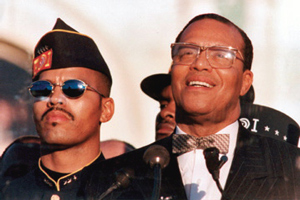
Min. Farrakhan speaks at historic Million Man March, which altered
twisted and dangerous images of Black men and his son
Mustapha is by his side.
'I thank Allah over and over and over again for this man because through him, he has taught me the greatest knowledge that one could teach another human being, which is the reality of God.' —Mustapha Farrakhan, Student Supreme Captain of the Nation of Islam |
He noted in the 1920s, 90 percent of Black children had their fathers in the home. The number dropped to 80 percent in 1960 and farther down today. “A lot of people love saying that slavery destroyed the Black family but if that were true and in 1920, 55 years after slavery concluded, then we would not have had 90 percent of our youth still with their fathers in the home. So what since slavery did this?” he asked.
The culprit is a combination of an economy that changed from agriculture to high tech manufacturing, the education system’s failure to prepare Black males for the change, and crack cocaine, he argued.
Black fathers’ challenges depend on their social and economic stations in life. Men with more means are obviously able to do more, but still undergo stress. Fathers with no means experience much more stress, especially for Black men who care for not just their children, but the siblings who might not be theirs, according to Ms. Akande.
“I’ve heard some dads say, ‘How can I take my son a new bicycle or $20 when his brother doesn’t have a bicycle or doesn’t have a dad who’s bringing him $20,’” she said.
A saving grace for Black fatherhood has been marriage, or “husband-hood” as Bilal Qayyum likes to call it. He has been married for 29 years and has five children and 13 grandchildren. Good fatherhood is linked to good marriages, he insists.
If people realized how important a father’s presence in his children’s and family’s lives really is, they would help them after that realization. “What I have learned over the years is if you’ve got the support system, you can deal with the trials facing you. For instance, folks talk about jobs, which is a crucial issue, but if you don’t have a place to stay and a support system while you get your life together, while you get a job, it’s likely you’re going to do something you shouldn’t do,” Mr. Qayyum said.
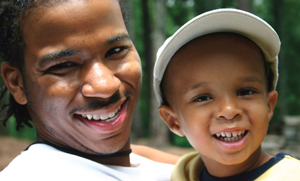
Min. Farrakhan speaks at historic Million Man March, which altered
twisted and dangerous images of Black men and his son
Mustapha is by his side.
|
Mr. Qayyum believes a Black fatherhood movement is picking up momentum and people are starting to celebrate their struggles and achievements more. “When we started our fatherhood picnic 23 years ago, it was like a rag-tag picnic with around 10 or 12 of us but in recent years, we’ve gotten corporate sponsorships and about 500 to 1,000 fathers and their families have come to our picnic,” he said.
Mustapha Farrakhan, son of the Honorable Minister Louis Farrakhan, underscored the importance of healthy, strong marriages and men understanding their roles and the roles of their mates. Both are critical to manhood and fatherhood development, he said.
As the Student Supreme Captain of the Nation of Islam, he is also responsible for the training of men and boys in the Nation.
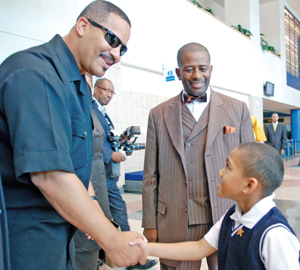
Mustapha Farrakhan, student Supreme Captain of the Nation of Islam, with student Central Regional
Capt. Anthony Muhammad greets a young Muslim child. Photo: Mikal Veale
|
Early in his own marriage, being poor was no excuse for not maintaining his role as a husband and then a father, said Mustapha Farrakhan. He knew he had to be the bread winner. “And I’d always seen my father in control of our household but my mother was really like the captain of the home,” he continued, referring to Mother Khadijah Farrakhan, First Lady of the Nation of Islam.
He reflected on Min. Farrakhan’s deep focus on his mission as a father to his own children and the love and sacrifice to attend to the needs of an entire people went hand-in-hand with his mother’s steadfast support and effort as a helpmeet. She was the cornerstone of the home, and particularly with his father steeped in the mission to spiritually resurrect and uplift Black people, Mustapha Farrakhan said.
“I thank Allah over and over and over again for this man because through him, he has taught me the greatest knowledge that one could teach another human being, which is the reality of God,” he said. Mustapha Farrakhan said whenever he may have felt sorry for himself or felt lacking when his father was hard at work, the knowledge imparted was invaluable.
He travels as a constant companion and protector of his father. He also works to support his wife Karen, and their children. He emphasized the importance of women as strong anchors for men.
“It’s very important because believe me, I could not be the type of father that I have been and that I am if I didn’t have the type of woman that I have, that absolutely put love in the children for me,” Mr. Muhammad said, his voice resonating with conviction.
But sometimes marriages fail; what should fathers do when that happens?
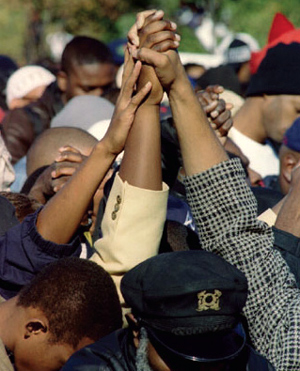
Men join in show of unity at Million Man March.
|
Reginald Brass, a family advocate for more than 23 years, said it is critical for children that fathers and mothers maintain peace despite the separation.
He learned these lessons during his own divorce and court battle to try to remain a part of his children’s lives. “I realized if I was having that much trouble trying to be a part of my child’s life, I could only imagine the next person coming up behind me, without the kind of money I had at that time. I was able to get help and still couldn’t get results,” Mr. Brass told The Final Call.
He set out to help educate men and women on how to civilly divorce and maintain family despite separation by creating “My Child Says Daddy,” a non-profit organization that offers individual and group parenting workshops focusing on teenage, married, divorced and separated parents. It also offers 12-week parenting classes.
“I had to make sure I wasn’t trying to make it about men against women, father against mother. I wanted to look at the whole picture versus some of the picture and now we help everybody navigate through the system to ensure they can continue to be a parent to their children,” Mr. Brass said.
Dr. Thomas Gordon, a clinical psychologist, said the question is how did things spiral down and how do Black men find their way back to their children?
Inspired by meeting Min. Farrakhan as a grad student and then attending the historic 1995 Million Man March with his two sons, Dr. Gordon developed the Black Fatherhood Challenge, an online effort to help Black men adopt better fatherhood practices.
It includes a 90-day challenge, set to launch on June 17, 2012, Fathers’ Day and will invite Muslims, Christians and people who don’t identify with religion to share their expertise online in areas such as medicine, health, and economics. The goal is to get fathers the advice they need to succeed.
“God has the power to make you successful despite the intensity of your opposition,” Min. Farrakhan stated June 10 on Twitter. He tweeted to his more than 54,000 followers: “Every day should be a day that you honor mother. Every day should be a day that we honor father. The words in the Lord’s Prayer tell you what a real father is and what a real father does. Read it and you will see exactly what I am referring to.”
His tweets were the latest in volumes of written and recorded guidance given to Black males regarding manhood, marriage and fatherhood.
During the historic Million Man March Pledge on the Washington, D.C. Mall in 1995, Min. Farrakhan asked the two million Black men physically there and those watching at home to take a life-altering pledge to be better men, brothers, husbands, and fathers.
The pledge was symbolic and conceptually sound, and very practical in presenting a way for men to acknowledge their behaviors and change them, Dr. Gordon said. He feels he’s standing on the shoulders of Min. Farrakhan and others who have worked to uplift Black men and humanity.
“Men don’t have to be perfect in the challenge but they can participate because to do something is the mark of a man. We’ve got to stop following and we’ve got to start leading our lives and there are some wonderful, constructive, positive things that men are doing,” Dr. Gordon said.
INSIDE STORIES AND REVIEWS
-
-
About Harriett ... and the Negro Hollywood Road Show
By Rabiah Muhammad, Guest Columnist » Full Story -
Skepticism greets Jay-Z, NFL talk of inspiring change
By Bryan 18X Crawford and Richard B. Muhammad The Final Call Newspaper @TheFinalCall » Full Story -
The painful problem of Black girls and suicide
By Charlene Muhammad -National Correspondent- » Full Story -
Exploitation of Innocence - Report: Perceptions, policies hurting Black girls
By Charlene Muhammad -National Correspondent- » Full Story -
Big Ballin: Big ideas fuel a father’s Big Baller Brand and brash business sense
By Bryan Crawford -Contributing Writer- » Full Story






 Click Here Stay Connected!
Click Here Stay Connected!








